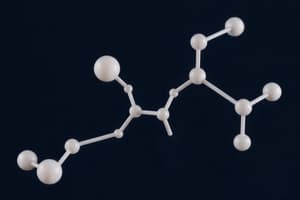Podcast
Questions and Answers
What is the classification of monosaccharides based on the number of carbon atoms?
What is the classification of monosaccharides based on the number of carbon atoms?
- Triose - 3 Carbon Atoms (correct)
- Pentoses - 5 Carbon Atoms (correct)
- Tetrose - 4 Carbon Atoms (correct)
- Hexoses - 6 Carbon Atoms (correct)
What are the classifications of monosaccharides based on functional groups?
What are the classifications of monosaccharides based on functional groups?
- Aldoses
- Ketoses
- Both A and B (correct)
- None of the above
What is an aldohexose?
What is an aldohexose?
Monosaccharide with an aldehyde group and 6 carbon atoms.
What is a ketopentose?
What is a ketopentose?
What structural feature distinguishes an aldose from a ketose?
What structural feature distinguishes an aldose from a ketose?
Which of the following is the simplest monosaccharide?
Which of the following is the simplest monosaccharide?
D-Glyceraldehyde is a chiral molecule.
D-Glyceraldehyde is a chiral molecule.
Dihydroxyacetone is a chiral molecule.
Dihydroxyacetone is a chiral molecule.
What are the cyclic forms of monosaccharides predominantly based on?
What are the cyclic forms of monosaccharides predominantly based on?
What is a pyranose?
What is a pyranose?
What is a furanose?
What is a furanose?
What distinguishes the α-form and β-form of D-Glucose?
What distinguishes the α-form and β-form of D-Glucose?
Monosaccharides in nature have cyclic forms because they can form internal hemiacetals that are unstable.
Monosaccharides in nature have cyclic forms because they can form internal hemiacetals that are unstable.
Flashcards are hidden until you start studying
Study Notes
Classification of Monosaccharides
- Monosaccharides are classified based on the number of carbon atoms:
- Trioses contain 3 carbon atoms.
- Tetrose contains 4 carbon atoms.
- Pentoses consist of 5 carbon atoms.
- Hexoses comprise 6 carbon atoms.
- Another classification differentiates monosaccharides by functional groups:
- Aldoses have one aldehyde group.
- Ketoses possess one ketone group.
Examples of Monosaccharides
- Aldohexose is a monosaccharide with an aldehyde group and 6 carbon atoms.
- Ketopentose features a ketone group and 5 carbon atoms.
Structural Features of Aldoses and Ketoses
- Aldoses are distinguished from ketoses based on the placement of the carbonyl group (aldehyde vs. ketone).
Simplest Monosaccharides
- D-Glyceraldehyde and Dihydroxyacetone are the simplest monosaccharides.
- D-Glyceraldehyde is chiral, meaning it has non-superimposable mirror images.
- Dihydroxyacetone is achiral, meaning it does not have stereoisomers.
Glyceraldehyde
- Glyceraldehyde is the simplest pentose.
- It is classified as a chiral molecule.
Dihydroxyacetone
- Dihydroxyacetone is the simplest ketose.
- It is achiral and possesses double bonds in its structure.
Cyclic Forms of Monosaccharides
- Monosaccharides with 5 or more carbon atoms predominantly exist in cyclic forms.
- Cyclic structures are in equilibrium with their open-chain forms.
- Formation of cyclic structures occurs when a carbonyl group reacts with a hydroxyl group on the fifth carbon atom.
- Cyclic monosaccharides can differ only by the orientation of substituents on the anomeric carbon atom.
Pyranose
- Pyranose is a cyclic monosaccharide characterized by a six-atom ring.
Furanose
- Furanose is a cyclic monosaccharide represented by a five-atom ring.
Anomers
- D-Glucose exists in two anomeric forms:
- The α-form has the -OH group at C1 and the CH2OH group at C5 positioned on opposite sides.
- The β-form has both groups on the same side.
Stability of Cyclic Monosaccharides
- Nature favors cyclic forms of monosaccharides because they can form stable internal hemiacetals.
Studying That Suits You
Use AI to generate personalized quizzes and flashcards to suit your learning preferences.




